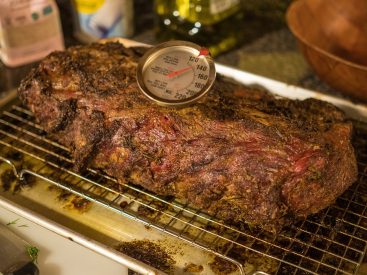
As a home cook, you may rely on your instincts and experience to gauge the doneness of your food. However, a reliable food thermometer is an essential tool that every home cook should have in their kitchen. From ensuring food safety to achieving perfect cooking results, a food thermometer is a valuable asset in the kitchen.
The Importance of a Reliable Food Thermometer
There are several reasons why a reliable food thermometer is crucial for every home cook:
Food Safety
One of the primary reasons to use a food thermometer is to ensure that your food is safely cooked and free from harmful bacteria. Improperly cooked food can lead to foodborne illnesses, such as salmonella and E. coli. By using a thermometer to check the internal temperature of your food, you can ensure that it reaches the recommended safe temperature, killing any potential pathogens and making your food safe to eat.
Precision Cooking
A food thermometer allows you to cook with precision, ensuring that your meats, poultry, and other dishes are cooked to the desired level of doneness. This is especially important for achieving perfectly cooked steaks, roasts, and poultry, where the difference of a few degrees can make a significant impact on the final result. Using a thermometer takes the guesswork out of cooking and helps you achieve consistent and delicious results every time.
Quality Assurance
When preparing dishes such as baked goods and custards, using a food thermometer helps you achieve the perfect texture and consistency. By monitoring the internal temperature of your dishes, you can prevent overcooking and ensure that your creations turn out just the way you intended. This is crucial for achieving professional quality results in your home kitchen.
Choosing the Right Food Thermometer
When selecting a food thermometer for your kitchen, it’s important to choose a reliable and accurate device. There are several types of food thermometers available, including digital, infrared, and probe thermometers. Each type has its own pros and cons, so it’s essential to choose the one that best suits your cooking needs.
Digital Thermometers
Digital thermometers are quick and easy to read, making them a popular choice for home cooks. They are available in various designs, including instant-read and leave-in thermometers, and can be used for a wide range of foods. Some digital thermometers also come with additional features, such as temperature alarms and programmable settings.
Infrared Thermometers
Infrared thermometers are non-contact devices that measure the surface temperature of food items. They are commonly used for grilling and outdoor cooking, as they provide instant readings without the need to insert a probe into the food. Infrared thermometers are ideal for checking the temperature of grills, pans, and other cooking surfaces, as well as for verifying the doneness of meats and other grilled foods.
Probe Thermometers
Probe thermometers consist of a metal probe attached to a digital display unit. The probe is inserted into the food, providing an accurate measurement of its internal temperature. Some probe thermometers come with a long, heat-resistant cable, allowing you to monitor the temperature of food inside the oven or grill without opening the door. This type of thermometer is ideal for roasts, poultry, and other large cuts of meat.
Conclusion
A reliable food thermometer is an indispensable tool for every home cook. From ensuring food safety to achieving perfect cooking results, a food thermometer helps you cook with confidence and precision. By choosing the right type of thermometer and using it consistently in your cooking, you can elevate the quality of your dishes and create delicious meals that are safe to eat.
FAQs
Q: Why is it important to use a food thermometer?
A: Using a food thermometer is important for ensuring that your food is safely cooked and free from harmful bacteria. It also helps you achieve the desired level of doneness and consistency in your cooking.
Q: How do I choose the right food thermometer for my kitchen?
A: When choosing a food thermometer, consider the types of foods you typically cook and the features that are important to you. Digital, infrared, and probe thermometers each have their own advantages, so it’s essential to select the one that best suits your cooking needs.
Q: Can I use a food thermometer for baking and other types of cooking?
A: Yes, a food thermometer can be used for various types of cooking, including baking, roasting, grilling, and stovetop cooking. It helps you achieve the perfect texture and doneness in a wide range of dishes.
Why We Need a Website
In addition to providing valuable information and resources, having a website dedicated to food thermometers can help home cooks find the right tools for their kitchen. By featuring product reviews, buying guides, and cooking tips, a website can serve as a go-to destination for anyone looking to enhance their cooking skills and ensure food safety. Quality keywords such as “reliable food thermometer”, “digital thermometer”, “infrared thermometer”, and “probe thermometer” can help the website rank higher in search engine results, making it easier for home cooks to discover and access the information they need.


